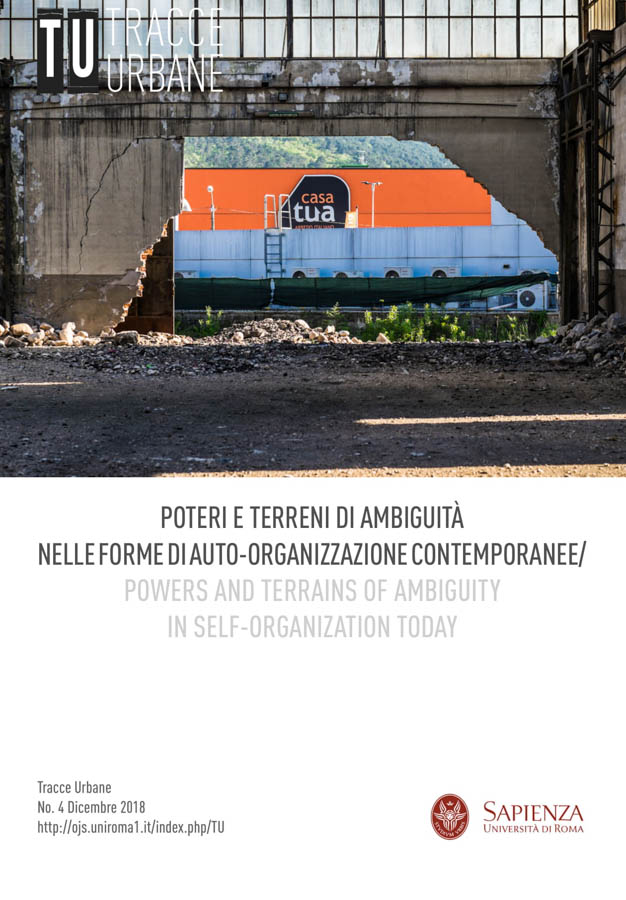The many paths of self-organization
DOI:
https://doi.org/10.13133/2532-6562_2.4.14437Parole chiave:
Auto-organizzazione, concetto e pratiche, auto-organizzazione e istituzioni, planning theory, teorie urbane e socialiAbstract
By exploring different cultural roots of self-organisation, the paper points out and discusses the lights and shadows of a concept, which is increasingly used both in mainstream theories and in critical thinking.
In so doing, the contribution aims at offering a basic framework for containing and giving sense to the various approaches to self-organization (as they emerge from the two issues of Tracce Urbane, n. 3 and 4, dedicated to that topic), yet sufficiently structured to allow orientation among the variants in which the concept is used in relation with the city. The intent is, therefore, also methodological, and concerns the consistence between theories and concepts, and the heuristics we adopt to analyse and explain spatial phenomena and practices.
Riferimenti bibliografici
Alfasi N., & Portugali J. (2007). «Planning rules for a self-planned city». Planning theory, 6(2): 164-182.
Alfasi N. (2018). «The coding turn in urban planning: Could it remedy the essential drawbacks of planning? ». Planning Theory 17 (3): 375-395.
Allen P.M., Sanglier M. (1978). «Dynamic models of Urban Growth». Journal of Social and Biological Structures I: 265-280.
Berger P.L., Luckmann T. (1966). The Social Construction of Reality, Garden City, New York: Doubleday & Co.
Decandia L. (2000). Dell’identità. Saggio sui luoghi: per una critica della razionalità urbanistica. Soveria Mannelli: Rubbettino.
Decandia L. (2013). «Ogni cosa è illuminata. Decifrare le sopravvivenze del passato per ritornare a prendersi cura dei territori contemporanei». Crios, 3(2): 21-32.
Decandia L., Lutzoni L. (2016). La strada che parla. Dispositivi per ripensare il futuro delle aree interne in una nuova dimensione urbana. Milano: FrancoAngeli.
Eizenberg E. (2018). «Patterns of self-organization in the context of urban planning: Reconsidering venues of participation». Planning Theory, DOI: 1473095218764225.
Haiven M. (2016). «The commons against neoliberalism, the commons of neoliberalism, the commons beyond neoliberalism». In: Springer, S., Birch, K., & MacLeavy, J. (Eds.). Handbook of Neoliberalism, New York: Routledge.
Jabareen Y. (2009). «Building a conceptual framework: Philosophy, definitions, and procedure». International Journal of Qualitative Methods 8(4): 49–62.
Kant I. (1952). The Critique of Judgement. Translated with Analytical Indexes by James Creed Meredith. Oxford: Clarendon Press [1st ed. 1790]. Or see this following edition: Kant I. (2001). Critique of the Power of Judgment. Cambridge University Press.
Lefebvre H., Kofman E. & Lebas E. (eds.) (1996). Writings on cities. Oxford: Blackwell. It includes ‘The right to the city’ (pp. 61 – 181) [1st ed., Paris, 1968].
Moroni S. (2005). L'ordine sociale spontaneo. Torino: Utet.
Moroni S. (2015). «Complexity and the inherent limits of explanation and prediction: Urban codes for self-organising cities». Planning Theory, 14(3): 248-267.
Nicolis G., Prigogine I. (1977). Self-organization in non-equilibrium systems. New York: Wiley.
Ostrom E. (1990). Governing the Commons: The Evolution of Institutions for Collective Action. Cambridge and New York: Cambridge University Press.
Park R. E. (1921). «Sociology and the social sciences: The social organism and the collective mind». American Journal of Sociology, 27(1): 1-21.
Peled A. (2000). «The new sciences, self‐organization and democracy». Democratization, 7(2): 19-35.
Portugali J. (1999). Self-organization and the city. Berlin-Heidelberg: Springer Verlag – Springer series in Synergetics.
Portugali J. (2008). «Learning from Pradoxes about Prediction and Planning in Self-organizing Cities». Planning Theory, 7(3): 248-262.
Pizzo B. (2015). «Problematizing resilience: Implications for planning theory and practice». Cities, 43: 133-140.
Prigogine I., Allen P.M., Herman R. (1977). «The evolution of complexity and the laws of nature». In: E. Lazslo, J. Bierman (eds.) (1977). Goals in a
Global Community, vol. I. Oxford: Pergamon Press.
Simmel G. (1958). Soziologie. Berlin: Dunker und Humboldt.
##submission.downloads##
Pubblicato
Come citare
Fascicolo
Sezione
Licenza
NOTA DI COPYRIGHT
Proposta di licenza Creative Commons
1. Proposta per riviste Open Access
Gli autori che pubblicano su questa rivista accettano le seguenti condizioni:
Gli autori mantengono i diritti sulla loro opera e cedono alla rivista il diritto di prima pubblicazione dell'opera, contemporaneamente licenziata sotto una Licenza Creative Commons - Attribuzione che permette ad altri di condividere l'opera indicando la paternità intellettuale e la prima pubblicazione su questa rivista.
Gli autori possono aderire ad altri accordi di licenza non esclusiva per la distribuzione della versione dell'opera pubblicata (es. depositarla in un archivio istituzionale o pubblicarla in una monografia), a patto di indicare che la prima pubblicazione è avvenuta su questa rivista.
Gli autori possono diffondere la loro opera online (es. in repository istituzionali o nel loro sito web) prima e durante il processo di submission, poiché può portare a scambi produttivi e aumentare le citazioni dell'opera pubblicata (Vedi The Effect of Open Access).


